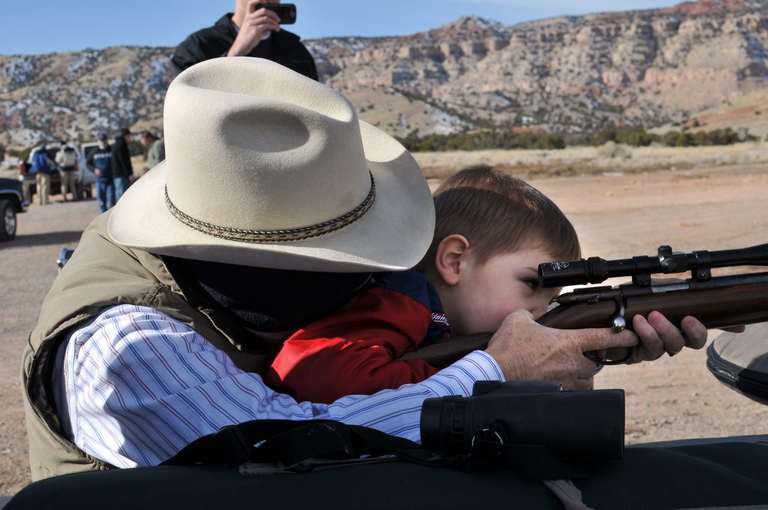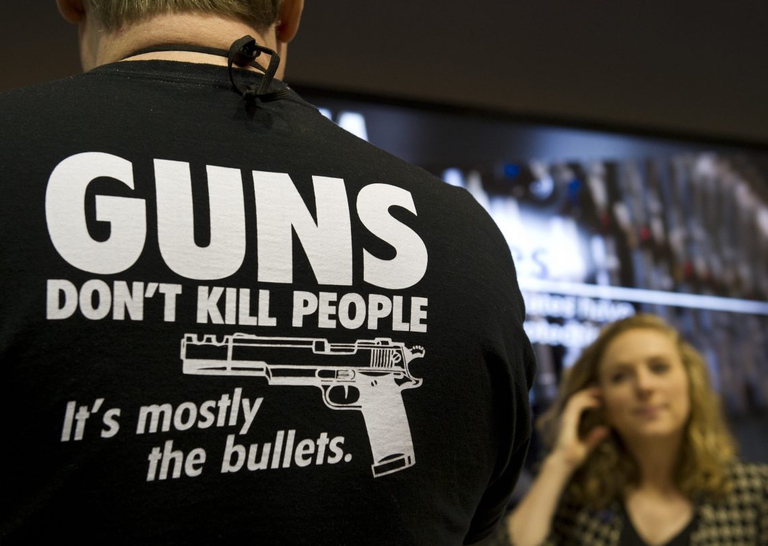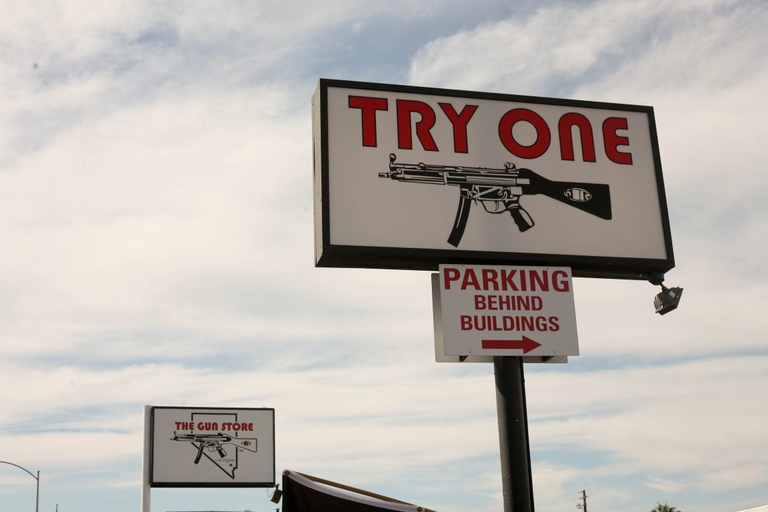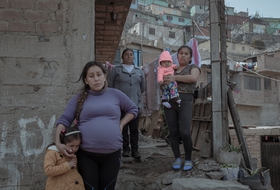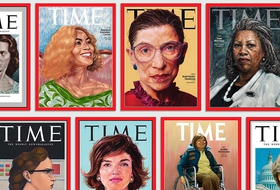
One in three women have suffered physical or sexual violence. With contributions from Europe, Africa, Asia and Latin America, we look at how this shadow pandemic affects every corner of the world.
After the freedom of religion, speech, press, assembly and petition, the American Constitution grants its citizens the right to bear arms with the Second Amendment. There have been many interpretations of the 27 words of the Amendment, which descends directly from 1689 English Bill of Rights. Guns have since then been at the heart of the United States’
After the freedom of religion, speech, press, assembly and petition, the American Constitution grants its citizens the right to bear arms with the Second Amendment. There have been many interpretations of the 27 words of the Amendment, which descends directly from 1689 English Bill of Rights. Guns have since then been at the heart of the United States’ foundation and identity, considered a symbol of their freedom.
Today Americans own 310,000,000 firearms, making it the first country for civilian gun ownership, the second being Yemen where the rate is half. Most Americans do not, however, own guns, because three-quarters of people with guns own two or more. While at the beginning of the 19th century the main reason for gun ownership was hunting, today the first reason people claim is self-defence (60 per cent). This feeling of vulnerability and the need for protection started in the late 1970s. Even though crime rates have dropped about half from their peak in 1991, polls indicate that mass shootings, terrorism and debate over gun control during Obama’s two terms have fueled a perception of high rates of violence in the country and thus fear for personal security. Gallup data (one of the most popular companies conducting polls in the US) shows that in any given year, about one in four Americans say they or someone in their household was victim to a crime, but only 6 per cent or less are victims of violent crimes. This suggests that news media reports probably have more of an effect on Americans’ perceptions of crime in the US than their personal experiences do.
The National Rifle Association (NRA) changed from a hunting and sporting association to a political organisation lobbying for gun rights during what is known today as the “Cincinnati Revolt” of 1977, when the moderate wing and leadership of the association was completely replaced by strong advocates of the right to bear arms essentially for self-defense against criminals and not for hunting. This transformed the narrative around the issue, bringing it to the forefront. The organisation began advancing the argument that the Second Amendment guarantees an individual’s right to carry a gun, rather than the people’s right to form armed militias to provide for common defence.
The gun industry’s way to survive a period of decline in hunting was to sell more handguns that could be concealed and used for personal defence, also exploiting the black civil rights movements for this purpose. Today, one can carry a concealed weapon legally in all 50 states, with very few exceptions. And last week, on Sept, 26th, in Missouri, a Republican-governed state, the law changed allowing citizens to carry concealed guns even without a state gun permit, criminal background check or firearms training.
“The thing is that our constitution needs to be a living document, it must reflect the changing times: as it is, it doesn’t reflect the American feeling today on firearms,” according to Craig Nass, a proud American citizen living in New York who is a gun owner. “We need better background checks and to stop the illegal gun trade. It shouldn’t be possible to buy a gun, even handguns or rifles, at trade shows where no background checks are necessary. Today it’s way too easy for a felon or a mentally ill person to buy firearms”.
In New York it isn’t possible to buy shotguns, but with only 2 weeks, 15 dollars and a change of address, Nass was able to legally buy more than one. “I own it for hunting, and in this country, there are many places where you need it to catch your food. I also used it a lot for target shooting, a really popular sport in the US. We have a gun culture, nothing will change this. But I wonder how I would react if anyone entered my property, if I have to defend myself”.
86 per cent of Americans are in favour of a better background checks, using a centralised database across all 50 states, and passing stricter laws on gun control, according a Gallup poll from October 2015. Yet the majority (53 percent) isn’t convinced that such laws would be effective in reducing mass shootings.
The majority of Americans thinks the gun issue will affect their voting behaviour during the upcoming November elections (26 per cent would only vote candidates who share their views on guns, and 54 per cent considers it as one of many important factors). During the debate between Trump and Clinton on Sept, 26th at Hofstra University, Hempstead, NY, the 3 main issues at stake were: achieving prosperity, America’s direction and securing America. Discussing on the last point, Trump and Clinton made clear their points on the issue: Clinton strongly believes in better-organized background checks, and in the importance of restoring trust between the communities and the police – she calls for a reform of criminal justice, taking into consideration the existing racist bias into police forces. “And we have to tackle the plague of gun violence, which is a big contributor to a lot of the problems that we’re seeing today”, she stated to close her intervention on the issue. Trump, on the other side, repeated more than once that America today needs law and order – and that there is not even going to be a country without law and order. More police, less illegal immigrants. And he stated he had the endorsement of NRA, of which he was very proud, because “they protect the Second Amendment right”.
Gun control was one of the main subjects of the debate between the candidates and this suggests that these elections will be won by the one who will better interpret and understand people’s biggest concern today: crime and violence. Also Nass is convinced that, besides economy, safety and fear will be very important factors while deciding the new President of the United States.
A complex mix of history, culture, economy and politics is what stands in the way of gun control in the United States and has prevented successful regulation, including President Obama’s recent efforts in this sense.
Siamo anche su WhatsApp. Segui il canale ufficiale LifeGate per restare aggiornata, aggiornato sulle ultime notizie e sulle nostre attività.
![]()
Quest'opera è distribuita con Licenza Creative Commons Attribuzione - Non commerciale - Non opere derivate 4.0 Internazionale.
One in three women have suffered physical or sexual violence. With contributions from Europe, Africa, Asia and Latin America, we look at how this shadow pandemic affects every corner of the world.
The Istanbul Convention against gender-based and domestic violence marks its tenth anniversary. We look at what it is, who its signatories are, and what the future might hold.
European Commission President Ursula von der Leyen reminded us of the gravity of violence against women around the world, and of the Istanbul Convention’s utmost importance.
President Erdoğan has pulled Turkey out of the Istanbul Convention, key in the fight against gender violence, claiming that it favours the LGBT community rather than family values.
Violence against women in Peru has increased as a result of Covid-19 lockdowns. 14,912 people were reported missing from January to November 2020, more than half of them minors and 64 per cent women. People have been confined to their homes for months, many forced to endure poor physical, economic and social conditions. A situation that
Joys Estefani Qqueccaño Huamani, 24, disappeared from her rural community in Peru on 9 October. Her family began looking for her independently of the authorities and despite the resistance of relatives of Joys Estefani’s ex-partner Arturo Ccana Condori, 32, charged with committing violence against her on 28 September, eleven days before Joys Estefani disappeared. Photos
Costa Rica celebrated its first same-sex marriage when two women, Alexandra Quiros and Dunia Araya, celebrated their wedding: an “extraordinary moment”.
The pandemic and its restrictions are affecting everyone, without exceptions. However factors like housing, income inequalities, gender, access to technology and working conditions are influencing how people experience the health crisis.
Time magazine’s 100 Women of the Year project sheds light on influential women’s stories, from Amelia Earhart to Greta Thunberg. A selection of some of the greats for International Women’s Day.
